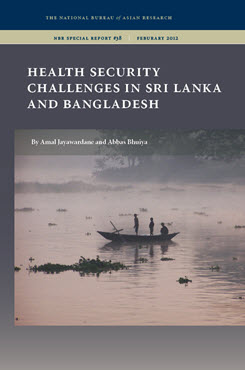Health Threats as Nontraditional Security Challenges for Bangladesh
This essay discusses health problems that have the potential to emerge as nontraditional security challenges for Bangladesh in the coming decades.
EXECUTIVE SUMMARY
MAIN FINDINGS
- The health scenario of Bangladesh has improved in terms of increased life expectancy, immunization success, fertility rate reduction, and a reduced proportion of severe undernutrition among children.
- Maternal health is a notable health security concern because Bangladesh has one of the highest maternal mortality rates in Asia.
- There have been significant advancements in the prevention and treatment of communicable diseases in Bangladesh. However, influenza outbreaks and the increased prevalence of HIV/AIDS and tuberculosis have the potential to become health security challenges in the future.
- It is estimated that two-thirds of Bangladesh’s groundwater is contaminated by arsenic. This poses a major health security challenge since many people still consume arsenic-contaminated water.
- Increased life expectancy is causing a demographic change as a larger percentage of the population is aging. Due to this trend, non-communicable diseases such as hypertension and diabetes will likely continue to rise.
POLICY IMPLICATIONS
- Bangladesh needs effective programs to improve access to healthcare facilities and skilled delivery care.
- Awareness should be raised within communities, especially among the marginalized and the poor, about health challenges and effective measures for the prevention and management of emerging health threats.
- Policymakers in Bangladesh should mitigate the conditions favoring the emergence and spread of new infectious diseases by enacting measures to curb opportunities for transmission.
- The population’s vulnerability to emerging health threats can be diminished through renewed public health efforts that involve social movements and collaborations on global health promotion.


